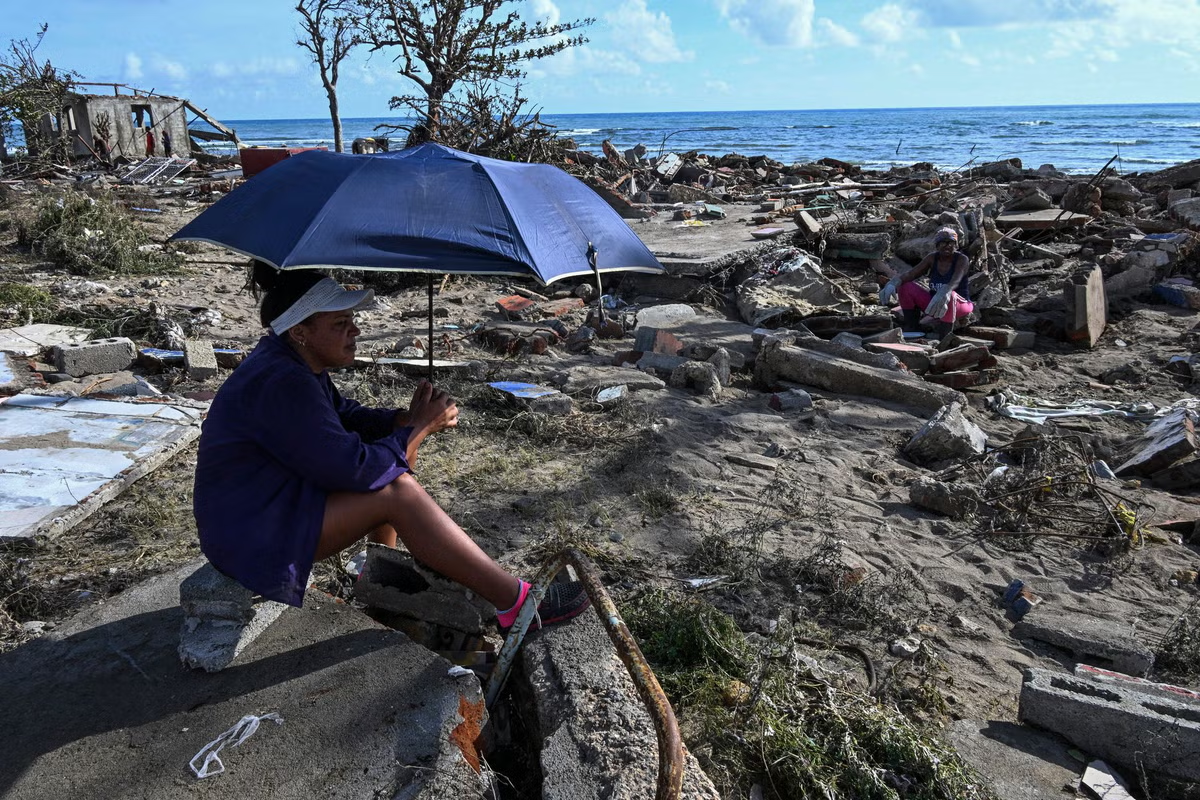Living through the storm that tore Jamaica apart

Hurricane Melissa’s wind thrashed and howled louder than a scream. Inside my home, voices whispered urgently as we frantically called family in south Saint Elizabeth, Jamaica, “You’ve reached the voicemail box of…” repeating relentlessly. When we finally got through, only my grandfather answered, crouched in his bathtub with a towel, pillow and sheet covering him, the wind pounding at his roof, lifting and ripping through the zinc.
Water seeped into his bedroom as he spoke fearfully through the static, and I knew he felt as if he was already drowning. My uncle, fearing his father – my grandfather – had been flooded or worse, braved the hurricane’s fury, darting between trees for cover as the wind clawed and stung his body. When he reached him, my 81-year-old grandfather – who I had never seen or heard cry – sobbed at the sight of his son coming to save him.
Our local WhatsApp groups buzzed at first as the hurricane had approached. Videos, voice notes and pictures flowed like breaking news. The wind first whispered through the trees, and Jamaica collectively held its breath as reports confirmed that Melissa had made landfall. Then a torrent of media: homes washing away in mudslides, death, people clawing at walls, screens from Jamaican, British, American and French news showing floods, people fleeing the sinking homes they had built.
The wind tore the ropes and tarpaulins protecting my veranda, the scent of dirt raw in our nostrils as my mother and I rushed to tie them down, only for them to rip again as the wind gusts grew stronger. Stray cats found refuge on my veranda, four small kittens piled atop each other under the car, sauntering out only to makeshift food stations before diving back into hiding.
Then the lights flickered out, and the phone lines went dead. Silence. Whatever messages came through were not good. My family and friends across the western parishes, Clarendon, Westmoreland, Saint James, and my hometowns of Saint Elizabeth and Manchester, shared accounts of roofs barely holding, rain soaking living rooms, freshly built kitchens decimated, pots clattering as they blew away in 185mph winds. Parents held their children as the storm lifted them from the bare earth, yet they still asked if I was safe and if my family was all right, our community standing strong amid destruction.
The devastation that met us as the sun rose on 29 October was heart-wrenching. As I write this in my bedroom, my laptop on 15 per cent, I think of my bed – drenched in darkness, with mosquitoes clawing at my skin, my asthmatic lungs labouring in the humid air – as my only refuge, accompanied by a small fan and battery pack. Yet that discomfort is nothing compared with what the Western parishes face.
A resident surveys the aftermath of Hurricane Melissa (AFP via Getty Images)
My mother, a police officer of 35 years, visited south Saint Elizabeth, Black River, Southfield and Treasure Beach, recounting how guest houses and family homes – places of laughter, warmth and community – were flattened, swept into the sea. Restaurants built from scratch by ambitious Jamaicans are gone or completely unrecognisable. Pieces of zinc, shell and concrete now form main roads in Black River and Treasure Beach, and clothes, toys and even art swirl in puddles.
Some residents, too scared to stay inside, ran into the rain when their homes became more dangerous than the hurricane itself. Many now remain missing. The few buildings now left standing serve as makeshift infirmaries, where doctors, police, firefighters and volunteers treat the injured, including children. Worried families wait behind blocked roads, braving hazardous terrain for any word of their loved ones.
Jamaica will be in recovery for years. Crops in our breadbasket parishes will take months to return, leaving us hungry for the watermelons, tomatoes, canteloupes, cabbages and bananas that root us. But houses will be rebuilt, land redug, foundations cast, and love will find its way into walls again.
For now, nobody will be praying for rain for months.




